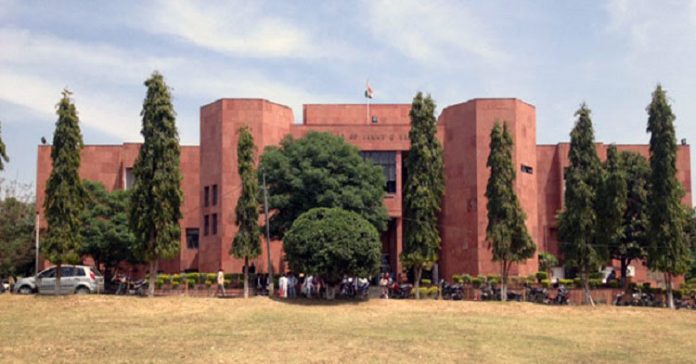
SRINAGAR — In a first, Jammu and Kashmir High Court has permitted a rape victim from Doda district to terminate her pregnancy.
A 17-year-old girl (name withheld), who was 26 weeks pregnant, needed the court’s assent since law allows termination after 20 weeks only if the mother’s life is in danger.
The abortion of the girl took place at Shri Maharaja Gulab Singh Hospital Jammu on July 11.
The girl alleges that she was kidnapped and raped by a man, Ashok Kumar on December 12 last year. He is under arrest. The decision to allow her to abort was taken by Justice Javaid Iqbal Wani after a panel of doctors submitted her medical report.
After a missing report was filed before the police, she was traced and handed over to her family on April 25. However, police didn’t incorporate offences punishable under rape and POCSO Act in the FIR filed on December 25, 2019 at Gandoh police station in Doda.
She was found pregnant by 21 weeks on May 6. The rape victim through her father moved a petition before the J&K High Court seeking permission for carrying out termination of the pregnancy by preserving the DNA samples for the fetus for the identification of the DNA as evidence in the FIR.
Court sought medical opinion from health experts as to whether termination of pregnancy of the victim would be medically permissible and feasible.
The medical report submitted by the expert team comprising two gynecologists, a radiologist and a forensic expert on June 29 said, “After thorough clinical examination, USG, radiological examination and lab interrogation, the board of doctors is of the opinion that she is carrying 24 weeks 2 days of pregnancy, termination of which is not allowed under Medical Termination of Pregnancy (MTP) Act. However, she can undergo termination of pregnancy after correction of anemia.”
Court on June 30 directed for further examination of the victim by a psychologist.
A report of examination of the victim by a psychologist at Government Medical College Jammu opined that she does not have any active psychopathologies and her mental status was normal.
Quoting MTP Act, 1971, the counsel for the victim Advocate Irfan explained that if a pregnancy is alleged by a pregnant woman to have been caused by rape, the anguish caused by such pregnancy shall be presumed to constitute a grave injury to the mental health of the pregnant woman.
“Pregnancy has been caused by the alleged rape, which constitutes a grave injury to the mental health of the victim and that the rider and restraint of 24 weeks is relaxed under the provision of Section 5 of the MTP Act, 1971,” Khan said.
Court of Justice Javed Iqbal Wani asked authorities at GMC Jammu and SMGS Hospital “to undertake a fresh examination of the victim by a Medical Board including a psychiatrist as well and on the basis of opinion/report of the Board, take a final call regarding termination of pregnancy of the petitioner-victim. Should the respondents (GMC Jammu and SMGS Hospital) on the basis of said medical opinion/report decide to undertake termination of pregnancy of the victim, necessary measures be also taken for preserving of DNA samples of the fetus.”
Court said for preserving of the DNA samples of the fetus, the Senior Superintendent of Police Doda and SHO Gandoh Police Station should be also associated therewith.
“It is needed to mention here that the victim be provided appropriate free medical facilities in the event of the termination of pregnancy,” the court said.
Crimes against women have been on the rise in India. In January 2018, an 8-year-old girl in Jammu was raped and brutally murdered by right-wing Hindutva workers. The Muslim girl was kidnapped, confined using sedatives and repeatedly gang-raped in a temple. She was strangled and then hit with a heavy stone.
More than 32,500 cases of rape were registered with the Indian police in 2017, about 90 a day, according to the most recent data issued by the Indian Government. A child under 16 is raped every 155 minutes, a child under 10 every 13 hours, reads the report.
Indian courts disposed of only about 18,300 cases related to rape that year, leaving more than 127,800 cases pending at the end of 2017. More than 10,000 children were raped in 2015. 240 million women living in India were married before they turned 18.
India, thus, has been dubbed “the most dangerous country for women” by many human rights activists. But why is India so prone to gender-based crimes?
In November, a 27-year-old vet in the southern city of Hyderabad was raped and set on fire, sparking huge protests across India.
Repeated rape cases have angered many in India. Some are now demanding the capital punishment for rapists. And there have also been calls for authorities to publicly hang the culprits. Experts say that this, too, shows a rise in violent tendencies in the country.
On December 6, the police shot all four accused of the Hyderabad rape case in an alleged extra-judicial killing. Many Indians lauded the police officers for dispensing “justice”. Videos on social media showed women in Hyderabad city sharing sweets and celebrating the killings. Analysts are of the view that a low conviction rate and the flaws in the country’s judicial system are giving way to vigilante justice.
Although the government has doubled prison terms for rapists to 20 years, civil society activists continue to demand a quicker implementation of the laws.
Follow Us
The Kashmir Pulse is now on Google News. Subscribe our Telegram channel and Follow our WhatsApp channel for timely news updates!










